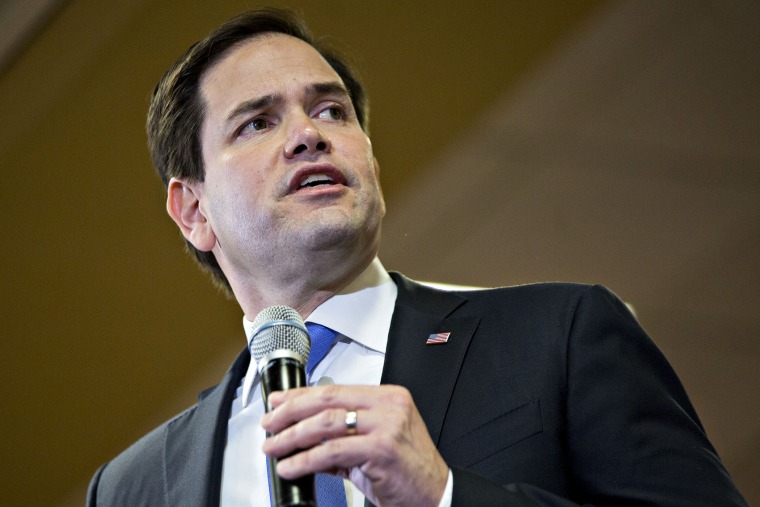In late December, Jeb Bush was asked about his descent from frontrunner status to middle of the Republican pack. The former governor insisted he was happy to be the underdog. "I feel much better back here," Bush said at the time.
This week, using eerily familiar language, Marco Rubio said, "I'm happy to be an underdog." He added it's "a role that I relish."
Right. Of course. Because after 15 primaries and caucuses, there's nothing a presidential hopeful likes more than being a candidate who's losing.
But making matters worse is Rubio's broader shift in posture. In the South Carolina primary and Nevada caucuses, the Florida senator eked out narrow second-place finishes over Ted Cruz, which didn't help Rubio much in the delegate count, though it did help with bragging rights. Immediately after those contests, Rubio declared himself the official second-place candidate and the rightful heir of the "anti-Trump" mantle.
As such, Rubio said, the under-performing candidates should do the right thing, bow out, and allow the party to coalesce around the top Trump rival -- which the senator insisted was him.
That's a vastly more difficult sell now. After 15 contests, Rubio has lost 14. In most of the primaries and caucuses, Rubio has finished third -- or worse. Cruz has more delegates than Rubio; Cruz has more money than Rubio; and Cruz has more wins than Rubio (four to one).
So, what does Rubio think about the winnowing strategy he was pushing so aggressively a couple of weeks ago? It appears the Floridian has thrown it out the window. Politico reported yesterday:
Ignoring Cruz's call for him to leave the race and the increasingly difficult delegate math, Rubio is focusing only on the contests ahead and continuing to prosecute his case against the clear GOP front-runner.
All that rhetoric about under-performing candidates doing the right thing? Such sentiments have quickly vanished from Rubio's vocabulary.
Imagine that.
The senator should realize, of course, that this approach isn't doing his reputation any favors. "The Daily Show" even mocked Rubio last night for being in "denial."
Looking ahead, Rubio insists he won't quit, his losses notwithstanding, but the race for delegates looks increasingly brutal. Vox did some number-crunching and concluded, "Rubio is so far behind that it's hard to see how he can win the 1,237 delegates needed to win the nomination on the first ballot. Indeed, he'd need to win nearly two-thirds of all remaining delegates to pull that off -- a highly implausible feat."
